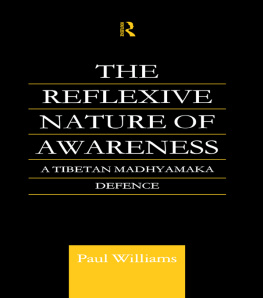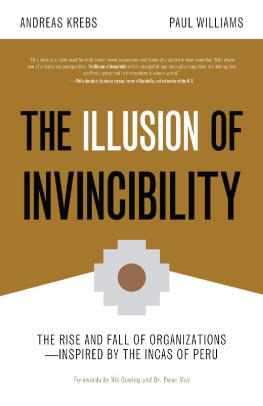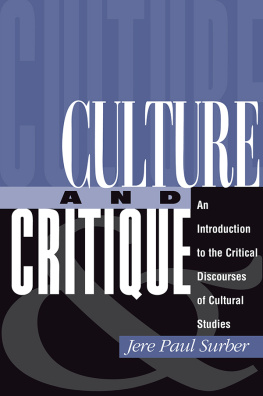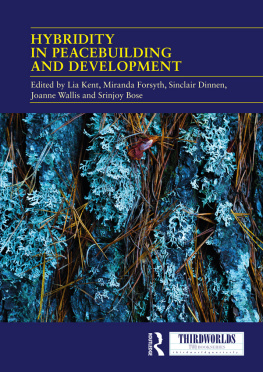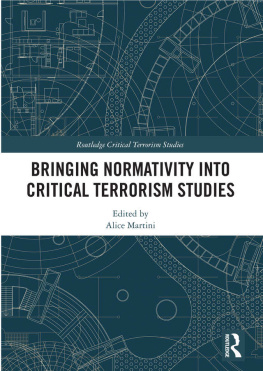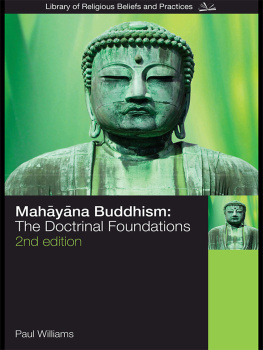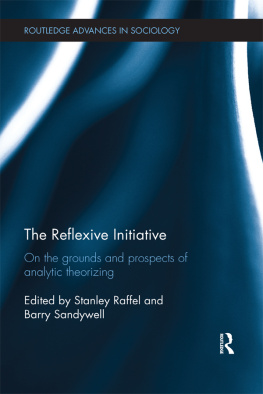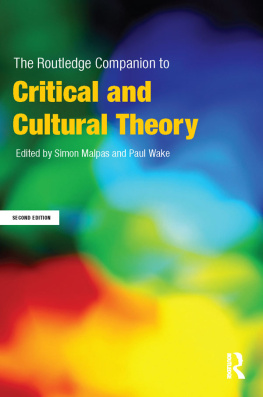Paul Williams - The Reflexive Nature of Awareness (Routledge Critical Studies in Buddhism)
Here you can read online Paul Williams - The Reflexive Nature of Awareness (Routledge Critical Studies in Buddhism) full text of the book (entire story) in english for free. Download pdf and epub, get meaning, cover and reviews about this ebook. year: 2013, publisher: Taylor and Francis, genre: Religion. Description of the work, (preface) as well as reviews are available. Best literature library LitArk.com created for fans of good reading and offers a wide selection of genres:
Romance novel
Science fiction
Adventure
Detective
Science
History
Home and family
Prose
Art
Politics
Computer
Non-fiction
Religion
Business
Children
Humor
Choose a favorite category and find really read worthwhile books. Enjoy immersion in the world of imagination, feel the emotions of the characters or learn something new for yourself, make an fascinating discovery.
- Book:The Reflexive Nature of Awareness (Routledge Critical Studies in Buddhism)
- Author:
- Publisher:Taylor and Francis
- Genre:
- Year:2013
- Rating:3 / 5
- Favourites:Add to favourites
- Your mark:
- 60
- 1
- 2
- 3
- 4
- 5
The Reflexive Nature of Awareness (Routledge Critical Studies in Buddhism): summary, description and annotation
We offer to read an annotation, description, summary or preface (depends on what the author of the book "The Reflexive Nature of Awareness (Routledge Critical Studies in Buddhism)" wrote himself). If you haven't found the necessary information about the book — write in the comments, we will try to find it.
The Reflexive Nature of Awareness (Routledge Critical Studies in Buddhism) — read online for free the complete book (whole text) full work
Below is the text of the book, divided by pages. System saving the place of the last page read, allows you to conveniently read the book "The Reflexive Nature of Awareness (Routledge Critical Studies in Buddhism)" online for free, without having to search again every time where you left off. Put a bookmark, and you can go to the page where you finished reading at any time.
Font size:
Interval:
Bookmark:
General Editors:
Charles W. Prebish
Pennsylvania State University
Damien Keown
Goldsmiths College, University of London
The Curzon Critical Studies in Buddhism Series is a comprehensive study of the Buddhist tradition. The series explores this complex and extensive tradition from a variety of perspectives, using a range of different methodologies.
The Series is diverse in its focus, including historical studies, textual translations and commentaries, sociological investigations, bibliographic studies, and considerations of religious practice as an expression of Buddhisms integral religiosity. It also presents materials on modern intellectual historical studies, including the role of Buddhist thought and scholarship in a contemporary, critical context and in the light of current social issues. The series is expansive and imaginative in scope, spanning more than two and a half millennia of Buddhist history. It is receptive to all research works that inform and advance our knowledge and understanding of the Buddhist tradition. The series maintains the highest standards of scholarship and promotes the application of innovative methodologies and research methods.
BUDDHISM AND HUMAN RIGHTS
Edited by Damien Keown, Charles Prebish, Wayne Husted
WOMEN IN THE FOOTSTEPS OF THE BUDDHA
Struggle for Liberation in the Therigatha
Kathryn R. Blackstone
ALTRUISM AND REALITY
STUDIES IN THE PHILOSOPHY OF THE
BODHICARYVATRA
Paul Williams
Paul Williams

For Leslie Kawamura
First Published in 1998
by Curzon Press
Published 2013 by Routledge
2 Park Square, Milton Park, Abingdon, Oxon OX14 4RN
605 Third Avenue, New York, NY, 10017, USA
Routledge is an imprint of the Taylor & Francis Group, an informa business
All rights reserved. No part of this book may be reprinted or reproduced or utilised in any form or by any electronic, mechanical, or other means, now known or hereafter invented, including photocopying and recording, or in any information storage or retrieval system, without permission in writing from the publishers.
British Library Cataloguing in Publication Data
A catalogue record of this book is available from the British Library
Library of Congress Cataloguing in Publication Data
A catalog record for this book has been requested
ISBN 13: 978-0-700-71030-0 (hbk)
DOI: 10.4324/9781315027302
This volume inaugurates a series of monographs on Buddhism as a part of the cultural and intellectual life and history of Tibet and the Tibetan cultural area, an area encompassing lands from the Himalayas to the far reaches of Mongolian civilisation. The Dharma Vajra Series will include works exploring the diversity of these traditions through a variety of approaches, including not only philosophical analyses, but also historical, sociological, and anthropological studies, textual and literary studies, bibliographic works, and studies of Buddhist arts and music.
We are fortunate indeed to have Paul Williams work on self-awareness (rang rig/svasavedana) as our lead volume both for its subject matter and its author. Self-awareness is a topic that is central to the practice of Tibetan Buddhismespecially the rDzogs chen tradition of the rNying ma schoolas well being one of the doctrinal points essential to Tibetan doxographic analyses of the Buddhist philosophies of Indian Mahyna. It is one of the notable issues in the dialogue between Yogcra and Madhyamaka Buddhism in India and later, in Tibet, between the dGe lugs tradition initiated by Tsong kha pa and writers such as Mi pham Jam dbyangs rnam rgyal rgya mtsho, dialogues that shed light not only on Buddhist views about the nature of the mind and of spiritual experience, but also on the primary ontological distinction made in Mahyna Buddhism, that between conventional and ultimate truth.
These are subjects that Paul Williams has explored for some time, beginning with his presentation to the Csoma de Krs Symposium held in Austria in 1981a paper subsequently published as On Rang Rig and included in its entirety as an appendix to the present work. The author has written prolifically on Madhyamaka in Tibetintroducing us to thinkers and ideas outside of the dGe lugs pa orthodoxy and, in so doing, giving voice to Tibetan philosophical interpretations that have not received as much attention as they should from modern Western scholars. His 1989 book Mahyna Buddhism: The Doctrinal Foundations (London and New York: Routledge) is well known for its lucid overview of the Mahyna texts and their philosophies not only in India and Tibet but throughout Asia. The present work is a continuation of what he has given us in the past: clear, but closely argued, expositions and analyses of Tibetan interpretations of Indian Buddhism, illuminated by a fine insight into the historical context of Tibetan Buddhist philosophising.
Joe Bransford Wilson
The University of North Carolina at Wilmington
This monograph began as an article for a collection of my papers on the Indo-Tibetan interpretation of verses from the Bodhicaryvatra. That book is forthcoming as Studies in the Philosophy of the Bodhicaryvatra. The article simply outgrew its paper format and has become an academic monograph, although it really belongs with those other papers. Research on the present work and most of the writing was completed during my tenure of the Numata Chair of Buddhist Studies at the University of Calgary, Winter 1994. I remain extremely grateful to the University of Calgary, its library, and the Department of Religious Studies for the wonderful facilities and hospitality they extended to me during that visit. I have developed a great affection for Calgary and its university, and the department showed itself a model of how to treat a visiting professor. In particular, I should like to thank my colleagues in Buddhist Studies at Calgary, Leslie Kawamura and A.W. Barber, together with their families, for their warm friendship, the stimulating discussions, and willingness to help and offer whatever might be needed for my research. I am grateful also to Ernst Steinkellner for permission to reprint as Appendix 2 my 1983 article On rang rig, and to my research student Ornan Rotem for covering some of my teaching while I was in Canada, and for his computing talents, patience and humor. A particular debt of gratitude is due to Joe Wilson, who not only accepted this book for inclusion in his series but also went over it minutely, helped with the preparation of the manuscript, and made a number of helpful suggestions. I should also like to record my appreciation of Ursula King for her encouragement and support, including financial support, for Buddhist Studies and the Centre for Buddhist Studies at the University of Bristol.
I am delighted to be able to dedicate this small book to Leslie Kawamura, a meticulous scholar who I am sure will not agree with much that I have written, a great enthusiast for Mi pham and one of the first to introduce Mi pham to Western scholarship.
Those with an interest in these things are now familiar with the idea that the philosophical and meditative tradition called rDzogs chen, known most notably from the rNying ma pa school of Tibetan Buddhism, teaches a primordial substratum (
Font size:
Interval:
Bookmark:
Similar books «The Reflexive Nature of Awareness (Routledge Critical Studies in Buddhism)»
Look at similar books to The Reflexive Nature of Awareness (Routledge Critical Studies in Buddhism). We have selected literature similar in name and meaning in the hope of providing readers with more options to find new, interesting, not yet read works.
Discussion, reviews of the book The Reflexive Nature of Awareness (Routledge Critical Studies in Buddhism) and just readers' own opinions. Leave your comments, write what you think about the work, its meaning or the main characters. Specify what exactly you liked and what you didn't like, and why you think so.

